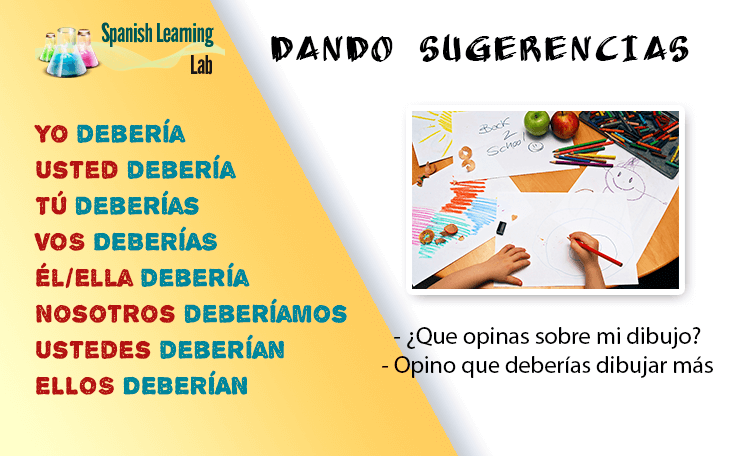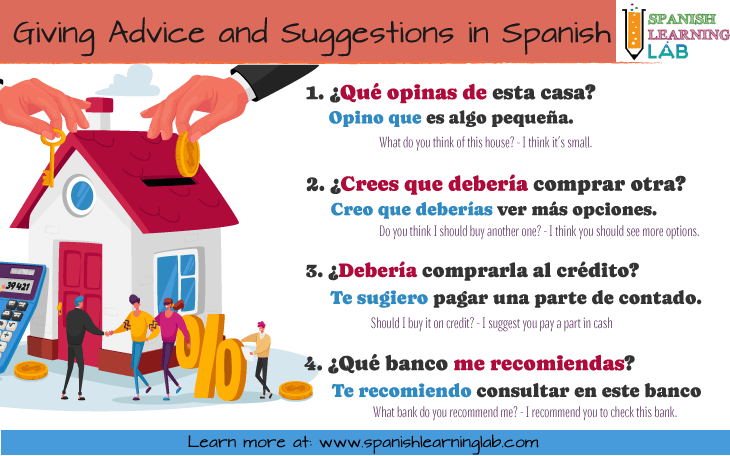¡Hola! In this lesson, we will show you different ways for giving advice and making suggestions in Spanish. You will find many examples of sentences and questions using the verbs “DEBER”, “SUGERIR” and “RECOMENDAR”. In addition, you will have the chance to practice with two listening activities and their respective quizzes. Let’s start…
Giving advice and making suggestions in Spanish
First, we use the word “Sugerencias” to refer to suggestions in Spanish and “Consejo” for advice. For the purpose of giving advice in Spanish, we normally use the equivalent form for SHOULD, that is DEBERÍA. The form “DEBERÍA” comes from the verb DEBER, which is used the same way as the modal verb “MUST” from the English language. Similarly to the modal “should”, DEBERÍA implies that someone should do something, but it is not his/her obligation to do such thing. Take a look at the picture below and notice how “DEBERÍA” must change a bit to match the subject in the sentence.

As you can see above, we changed the meaning from order to suggestion simply by adding the suffix -ÍA to the verb DEBER. In addition to DEBERÍA, the verbs “SUGERIR” and “RECOMENDAR” can be used to make suggestions in Spanish, for example: “Te sugiero comprar esta casa” (I suggest you to buy this house) and “Te recomiendo ahorrar dinero” (I recommend you to save money). When you give a suggestion or advice in Spanish, you must use indirect object pronouns properly to indicate “to whom” you are giving a specific recommendation, which is why we used the word “TE” before the verbs SUGERIR and RECOMENDAR in the last two examples. Take a look at the following picture and read each example carefully to analyze these essential expressions to ask and give advice and suggestions in Spanish.

Examples of suggestions in Spanish
Listen to some examples of ways to ask for advice in Spanish and possible answers you would hear in those situations. Pay attention to how some common phrases that accompany suggestions in Spanish, such as “Creo que…” and “Opino que…”, are used in the examples. Try to read and listen to the examples carefully so that you can solve the exercises for both listening activities easily afterward.
Example No. 1
- Ana: Tenemos que organizar todo para el evento de mañana ¿Qué crees tú que deberíamos cocinar?
- Pedro: ¿Qué te parece si cocinamos comida mexicana?
- Ana: Podemos cocinar tacos mexicanos, quesadillas y burritos. ¿Qué dices si compramos una piñata?
- Pedro: Me parece buena idea, aunque deberíamos comprarla hoy porque mañana será más difícil encontrar una buena piñata.
Example No. 2
- Pedro: Ven para acá Ana, quiero pedirte un consejo.
- Ana: Dame un segundo…. Listo.
- Pedro: Verás, no me decido sobre cuál de estas casas comprar. La roja es pequeña, no tiene garaje, pero queda en el centro. La verde es espaciosa, tiene garaje y una vista hermosa, pero está alejada del centro.
- Ana: Bueno, veo que la ciudad está creciendo rápidamente y tu familia es algo grande. Opino que deberías elegir la casa más espaciosa. De todas maneras, puedes llegar al centro en menos de diez minutos en tu auto.
Example No. 3
- Ana: He estado enferma. Ya tomé té y algunas medicinas de venta libre, pero no he mejorado. ¿Crees que debería ir al doctor?
- Pedro: Pienso que sería lo mejor. Descansar y tomar otras medicinas podría servir, pero mi recomendación personal es que vayas al doctor.
- Ana: La verdad es que no quiero que me receten inyecciones, les tengo miedo.
- Pedro: Te sugiero que sigas las indicaciones del médico. No tengas miedo, seguro solo te pinchará un par de veces.
Example No. 4
- Ana: Ven Pedro, recomiéndame lugares a visitar en Colombia.
- Pedro: Uff… hay, hay tantos lugares ahí. Si quieres nadar o disfrutar de un pueblo acogedor, deberías visitar Santa Marta. Las playas son hermosas y el pueblo es una belleza.
- Ana: Ah, sí, he visto fotos y se ve lindo. ¿Me puedes recomendar algún lugar con arquitectura especial?
- Pedro: Definitivamente, tú tienes que visitar Cartagena de Indias. Es una ciudad con muchas edificaciones históricas, desde fortalezas a iglesias. Es única.
Listening Activity No.1: Giving Advice in Spanish – Dando consejos
Listening Activity No.2: Asking for and making suggestions in Spanish
Key questions and phrases in the conversation:
- “¿Tú te sabes alguno?” means “Do you know any?”
- “¡Qué rico!” means “So delicious!”
- “Empacho” is a word used in Spanish to refer to a severe stomachache
You got to the end of this lesson. We hope that you are now able to give some good advice or suggestions in Spanish, following the key grammar rules that shaped the examples and listening activities that we introduced here. Keep practicing with us! ¡Hasta la próxima!
Related Spanish Worksheets:
- The Conditional Simple in Spanish – PDF Worksheet
- The Conditional Perfect in Spanish – PDF Worksheet
- “What would you do if …?” in Spanish – Conversation Cards
- At the Hospital in Spanish – PDF Worksheet